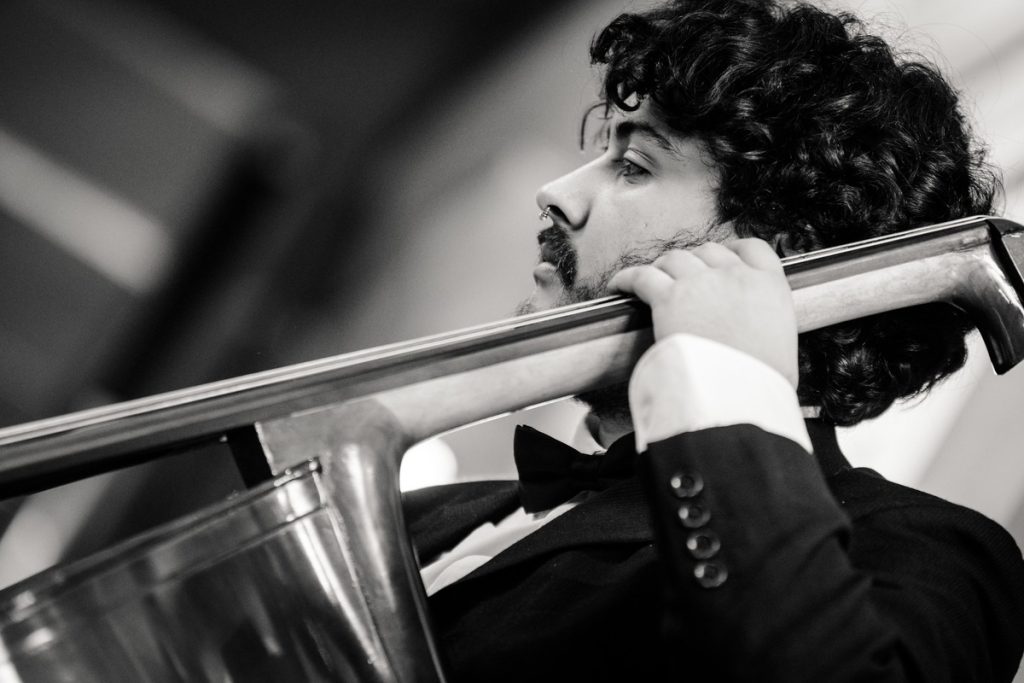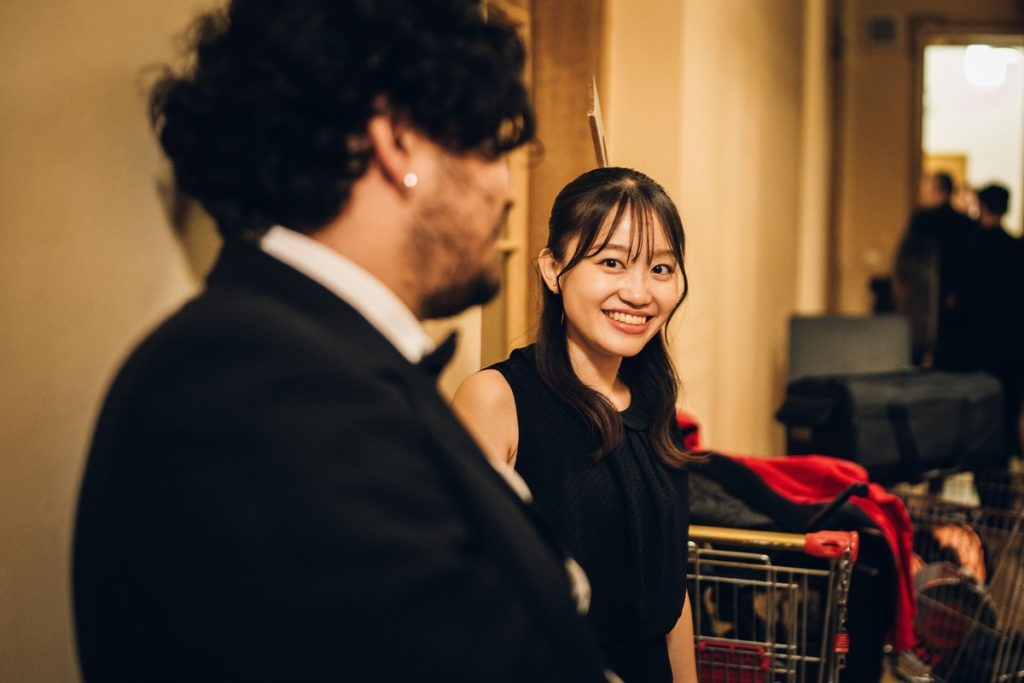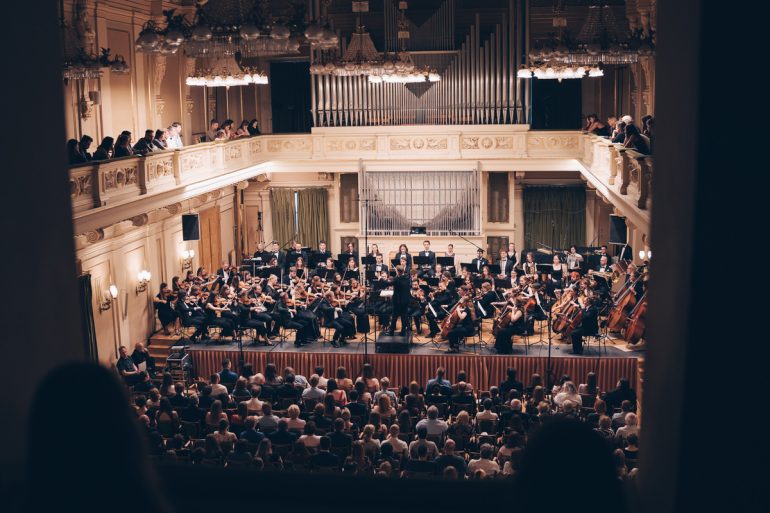Founded and conducted by Martin Mazánek, the MUNI Orchestra is a symphony orchestra consisting of around 70 students from various faculties at Masaryk University – and from across Brno’s universities – who share a strong passion for music. On Wednesday 28 May, the orchestra will perform a sunset concert featuring well-known film soundtracks, including those from Avatar, Back to the Future, Star Wars and Harry Potter, in the courtyard of Špilberk Castle. Brno Daily spoke to Mariano Vizcaya Michalides, a Mexican double bassist, and Saki Tokushige, a Japanese percussionist, about their thoughts and experiences as foreign nationals in the MUNI Orchestra.
BD: Can you tell us a bit about yourself? Where are you from, what are your main interests, and how did your passion for music began?
M: My name is Mariano. I have lived in Brno for almost four years, but I am originally from Mexico, a country coexisting with music at all times. We sing, dance, and find every chance to connect with music. I believe my passion for music has always been with me; it was just a matter of turning it into something bigger. Apart from music, I am interested in literature, cooking, and sightseeing whenever possible!
S: I’m Saki, and I’m from Japan. I study psychology in Tokyo, and I am currently an exchange student in Brno. However, music is my other big passion! I started learning the piano around age six, which is really common in Japan. Many girls learn the piano at some point during their education, but I switched to percussion when I entered junior high school. That’s when I joined my first orchestra, a wind ensemble, and I became really passionate about it! I’ve been playing ever since.
BD: When did you first come to Europe, and what led you to choose Brno as your destination?
M: I came to Europe when I turned 18 and spent a few years studying at the conservatory in Bratislava. After that, I decided it was time for a change—I wanted to continue my university studies in a new city. The first time I visited Brno was actually for a concert; one of my favorite bass players was performing with the local symphony orchestra. After the concert, I wandered around the city and was really drawn to the atmosphere—it felt warm and welcoming. Later on, I started looking into courses at Masaryk University and came across a really interesting programme in Spanish and Portuguese literature, so I enrolled and moved to Brno!
S: I chose Brno because Masaryk University offers great courses for exchange students. One thing I really appreciated was the flexibility—exchange students can take classes from almost any faculty, and there weren’t strict requirements like a minimum number of exams or credits to join. Since I was interested in exploring different subjects, it felt like the perfect fit. Beyond the university, I was excited to study somewhere in Europe, and from the moment I arrived in Brno, I felt safe and comfortable. The city is beautiful, the atmosphere is relaxed, and the people are genuinely kind. The longer I live here, the more I fall in love with it—it really feels like I made the right choice.

BD: When did you first join the MUNI Orchestra, and how did you hear about it?
M: I joined the MUNI orchestra in my first semester here in Brno. I was looking for a way to keep playing music in my new city, and while I was registering for classes, I randomly typed in “orchestra” and found out that the university actually had one! I signed up right away, without giving it much thought. Later, I had an interview with the conductor where I told him about my background and experience with my instrument, and he welcomed me into the orchestra.
S: Just like Mariano, I didn’t want to give up my passion for music when I came to Brno and since I play the timpani, I knew I needed to join an orchestra in order to do that, because it’s not an instrument you can play by yourself. One of my friends who had studied abroad in Europe before me told me that she had joined an orchestra at her university. I thought, maybe my university has an orchestra too? And I found it! Having always been a part of a wind ensemble I was particularly excited to finally have the opportunity to join a symphony orchestra!
BD: Do you speak Czech? Has language been a barrier for you, whether in everyday life or within the orchestra?
M: Well, I speak Slovak, which I learned when I studied in Bratislava. At first, I didn’t like the idea of having to learn another language – Czech – when I moved to Brno, but when I arrived, I realized that Czechs understand Slovak very well, especially in Moravia, where the Slovak community is large. I love how Slovaks and Czechs coexist. As for the orchestra, I haven’t had any problems, but I know my colleagues would help me if I did!
S: I can’t speak or understand Czech, but I didn’t really feel it was a big problem in my everyday life. Most people my age speak English fluently, and I always find a way to make myself understood, even at the grocery store or when I order at a café. In the orchestra, every explanation from the conductor is, of course, in Czech, but thankfully, my colleagues translate for me, so I can always keep up!

BD: What has been the most meaningful or surprising difference you’ve experienced between making music in MUNI orchestra and in your home country?
M: Unfortunately, I never had the opportunity to play in a Mexican orchestra, so I can’t make a proper comparison, but I remember that in some of the previous programmes, our conductor chose “Danzón No. 2” by Arturo Márquez, a Mexican composer, as part of the repertoire. It was a joy for me to get closer to my country in this way, and to have played on behalf of Mexico from Brno. I love the piece, and I was delighted to see that my colleagues liked it, too! (While we played, they even danced a little!)
S: In Japan, most of our rehearsals focus on preparing for competitions. As those dates get closer, there’s a lot of tension and stress – there’s a strong belief that a high-pressure environment is necessary in order to succeed. But after joining the MUNI orchestra, I had a totally different experience. I realized that music isn’t just about competing — it’s also about enjoyment. People in the orchestra are there because they love playing music. Some of them even switch instruments from time to time just to try something new and have fun with it and I think that is so cool.
BD: How has your experience with the MUNI Orchestra been so far? What makes it unique?
M: My experience in MUNI orchestra has been excellent. It motivated me to keep improving on my instrument and introduced me to film music, a genre I wasn’t very familiar with before. Thanks to the orchestra, I had the chance to perform in venues I never imagined I would, such as Kroměříž Palace and Smetana Hall in Prague. Those concerts were truly special, and I’ll never forget them. My orchestra colleagues were always supportive, and the time spent with them has always been very pleasant.
S: In Japanese, the word for music literally means “enjoying the sound,” and that’s exactly what I experience here in the orchestra. People here are genuinely kind and value the time spent together. Members come to rehearsals not just to play, but also to socialize. After every rehearsal, many of us go out for a drink and stay together until one or two in the morning! I also really cherish the repertoire we play. Last semester, we performed Tchaikovsky’s Swan Lake, which has always been a dream of mine – to perform such a classical masterpiece! And now, with an upcoming concert focused on film music, I could explore even more.
Full information and tickets for the concert at Špilberk Castle are available on the Facebook event.






